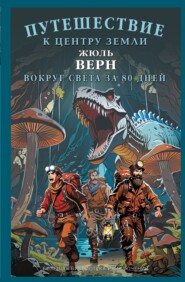По всем вопросам обращайтесь на: info@litportal.ru
(©) 2003-2024.
✖
From the Earth to the Moon, Direct in Ninety-Seven Hours and Twenty Minutes: and a Trip Round It
Настройки чтения
Размер шрифта
Высота строк
Поля
"That is just like those scientific men: they never do anything else. I would give twenty pistoles if we could fall upon the Cambridge Observatory and crush it, together with the whole lot of dabblers in figures which it contains."
Suddenly a thought struck the captain, which he at once communicated to Barbicane.
"Ah!" said he; "it is seven o'clock in the morning; we have already been gone thirty-two hours; more than half our passage is over, and we are not falling that I am aware of."
Barbicane did not answer, but after a rapid glance at the captain, took a pair of compasses wherewith to measure the angular distance of the terrestrial globe; then from the lower window he took an exact observation, and noticed that the projectile was apparently stationary. Then rising and wiping his forehead, on which large drops of perspiration were standing, he put some figures on paper. Nicholl understood that the president was deducting from the terrestrial diameter the projectile's distance from the earth. He watched him anxiously.
"No," exclaimed Barbicane, after some moments, "no, we are not falling! no, we are already more than 50,000 leagues from the earth. We have passed the point at which the projectile would have stopped if its speed had only been 12,000 yards at starting. We are still going up."
"That is evident," replied Nicholl; "and we must conclude that our initial speed, under the power of the 400,000 lbs. of gun-cotton, must have exceeded the required 12,000 yards. Now I can understand how, after thirteen minutes only, we met the second satellite, which gravitates round the earth at more than 2000 leagues' distance."
"And this explanation is the more probable," added Barbicane, "because, in throwing off the water enclosed between its partition-breaks, the projectile found itself lightened of a considerable weight."
"Just so," said Nicholl.
"Ah, my brave Nicholl, we are saved!"
"Very well then," said Michel Ardan quietly; "as we are safe, let us have breakfast."
Nicholl was not mistaken. The initial speed had been, very fortunately, much above that estimated by the Cambridge Observatory; but the Cambridge Observatory had nevertheless made a mistake.
The travellers, recovered from this false alarm, breakfasted merrily. If they ate a great deal, they talked more. Their confidence was greater after than before "the incident of the algebra."
"Why should we not succeed?" said Michel Ardan; "why should we not arrive safely? We are launched; we have no obstacle before us, no stones in our way; the road is open, more so than that of a ship battling with the sea; more open than that of a balloon battling with the wind; and if a ship can reach its destination, a balloon go where it pleases, why cannot our projectile attain its end and aim?"
"It will attain it," said Barbicane.
"If only to do honour to the Americans," added Michel Ardan, "the only people who could bring such an enterprise to a happy termination, and the only one which could produce a President Barbicane. Ah, now we are no longer uneasy, I begin to think, What will become of us? We shall get right royally weary."
Barbicane and Nicholl made a gesture of denial.
"But I have provided for the contingency, my friends," replied Michel; "you have only to speak, and I have chess, draughts, cards, and dominoes at your disposal; nothing is wanting but a billiard-table."
"What!" exclaimed Barbicane; "you brought away such trifles?"
"Certainly," replied Michel, "and not only to distract ourselves, but also with the laudable intention of endowing the Selenite smoking divans with them."
"My friend," said Barbicane, "if the moon is inhabited, its inhabitants must have appeared some thousands of years before those of the earth, for we cannot doubt that their star is much older than ours. If then these Selenites have existed their hundreds of thousands of years, and if their brain is of the same organization as the human brain, they have already invented all that we have invented, and even what we may invent in future ages. They have nothing to learn from us, and we have everything to learn from them."
"What!" said Michel; "you believe that they have artists like Phidias, Michael Angelo, or Raphael?"
"Yes."
"Poets like Homer, Virgil, Milton, Lamartine, and Hugo?"
"I am sure of it."
"Philosophers like Plato, Aristotle, Descartes, Kant?"
"I have no doubt of it."
"Scientific men like Archimedes, Euclid, Pascal, Newton?"
"I could swear it."
"Comic writers like Arnal, and photographers like – like Nadar?"
"Certain."
"Then, friend Barbicane, if they are as strong as we are, and even stronger – these Selenites – why have they not tried to communicate with the earth? why have they not launched a lunar projectile to our terrestrial regions?"
"Who told you that they have never done so?" said Barbicane seriously.
"Indeed," added Nicholl, "it would be easier for them than for us, for two reasons; first, because the attraction on the moon's surface is six times less than on that of the earth, which would allow a projectile to rise more easily; secondly, because it would be enough to send such a projectile only at 8000 leagues instead of 80,000, which would require the force of projection to be ten times less strong."
"Then," continued Michel, "I repeat it, why have they not done it?"
"And I repeat," said Barbicane; "who told you that they have not done it?"
"When?"
"Thousands of years before man appeared on earth."
"And the projectile – where is the projectile? I demand to see the projectile."
"My friend," replied Barbicane, "the sea covers five-sixths of our globe. From that we may draw five good reasons for supposing that the lunar projectile, if ever launched, is now at the bottom of the Atlantic or the Pacific, unless it sped into some crevasse at that period when the crust of the earth was not yet hardened."
"Old Barbicane," said Michel, "you have an answer for everything, and I bow before your wisdom. But there is one hypothesis that would suit me better than all the others, which is, that the Selenites, being older than we, are wiser, and have not invented gunpowder."
At this moment Diana joined in the conversation by a sonorous barking. She was asking for her breakfast.
"Ah!" said Michel Ardan, "in our discussion we have forgotten Diana and Satellite."
Immediately a good-sized pie was given to the dog, which devoured it hungrily.
"Do you see, Barbicane," said Michel, "we should have made a second Noah's Ark of this projectile, and borne with us to the moon a couple of every kind of domestic animal."
"I dare say; but room would have failed us."
"Oh!" said Michel, "we might have squeezed a little."
"The fact is," replied Nicholl, "that cows, bulls, and horses, and all ruminants, would have been very useful on the lunar continent, but unfortunately the car could neither have been made a stable nor a shed."
"Well, we might at least have brought a donkey, only a little donkey; that courageous beast which old Silenus loved to mount. I love those old donkeys; they are the least favoured animals in creation; they are not only beaten while alive, but even after they are dead."
"How do you make that out?" asked Barbicane.
"Why," said Michel, "they make their skins into drums."

















